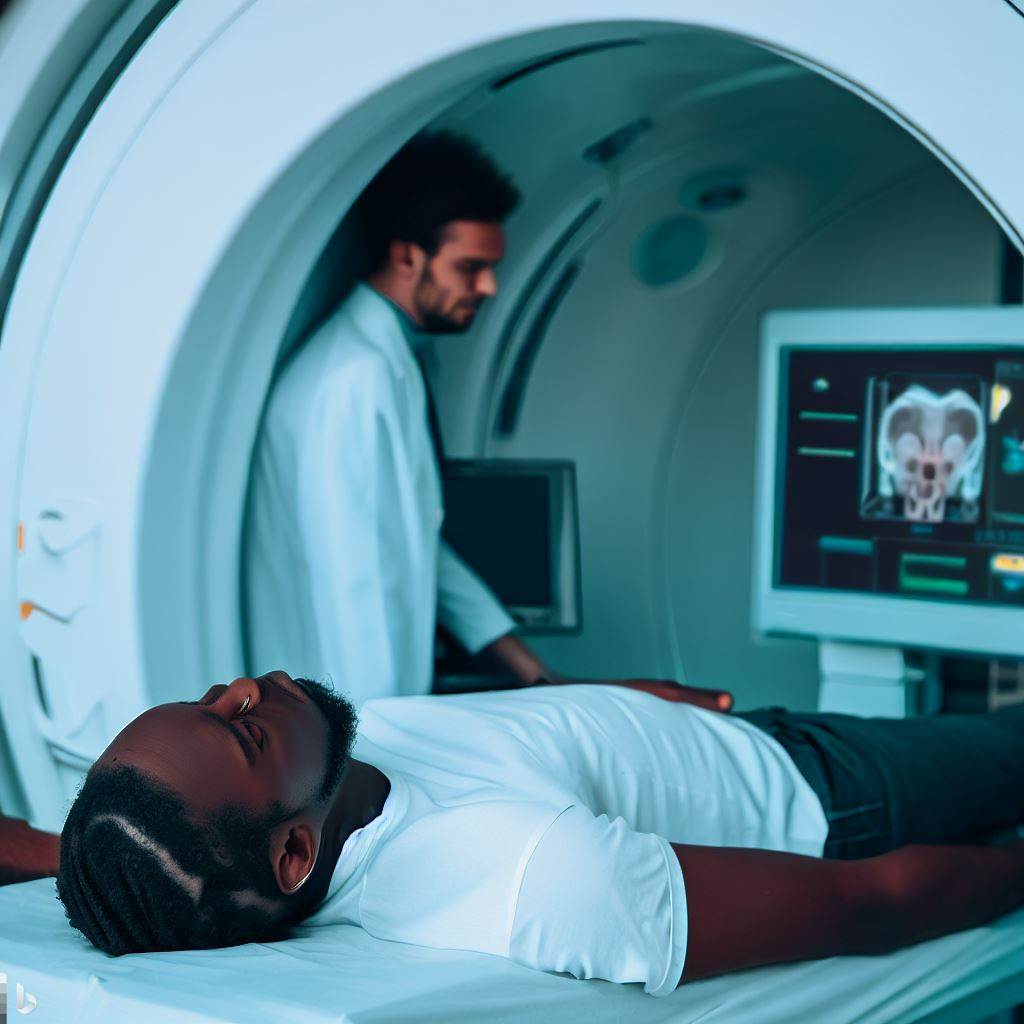Introduction
In this blog, we will explore the role of an MRI technologist in Nigeria and the significance of MRI technology in diagnosing medical conditions.
An MRI technologist is a healthcare professional responsible for operating magnetic resonance imaging (MRI) machines. These machines use powerful magnets and radio waves to create detailed images of the body’s internal structures.
MRI technology plays a crucial role in diagnosing various medical conditions as it provides highly detailed images that help healthcare professionals identify and understand abnormalities or diseases within the body.
In Nigeria, the role of an MRI technologist is vital in ensuring accurate and reliable diagnoses. They work closely with radiologists, physicians, and other healthcare professionals to perform MRI scans on patients, following strict protocols to ensure patient safety and image quality.
The MRI technologist’s responsibilities include preparing patients for the scan, explaining the procedure, positioning patients correctly, and operating the MRI machine to acquire images of the desired area.
They must also monitor patients throughout the scan to ensure their comfort and safety.
Furthermore, an MRI technologist plays a crucial role in maintaining and troubleshooting the MRI machine to ensure its optimal performance.
They must possess extensive knowledge of MRI technology and be skilled in producing high-quality images.
Basically, the role of an MRI technologist in Nigeria is essential for the accurate diagnosis of medical conditions.
Their expertise in operating MRI machines and producing high-quality images greatly contributes to the overall healthcare system in Nigeria.
Education and Training
When it comes to the field of MRI technology, a strong educational background is crucial. In order to become an MRI technologist in Nigeria, individuals must meet certain requirements and undergo specialized training.
Here is a breakdown of the necessary education and training for aspiring MRI technologists:
Required educational background for becoming an MRI technologist in Nigeria
- A minimum of a bachelor’s degree in Radiologic Technology or a related field is required.
- Completion of an accredited MRI technology program is essential.
- Background courses in physics, anatomy, and biology are highly recommended.
Accredited institutions offering MRI technology programs
- The Nigerian Institute of Medical Research (NIMR) offers a comprehensive MRI technology program.
- The School of Radiography at the University College Hospital (UCH) also provides specialized training in MRI technology.
- The College of Medicine at the University of Lagos offers a highly regarded MRI technology program.
Duration of the training program
The duration of the training program to become an MRI technologist typically lasts for two to three years, depending on the institution and the curriculum.
This includes both theoretical coursework and practical hands-on experience.
Certification and licensing requirements
After completing the necessary education and training, individuals must obtain certification and licensing to practice as MRI technologists in Nigeria. The following steps are required:
- Pass the Nigerian Institute of Radiographers (NIR) certification examination for MRI technologists.
- Apply for licensure from the Radiographers Registration Board of Nigeria (RRBN).
- Submit all required documents and pay the necessary fees to obtain the license.
- Maintain continuing education credits to renew the license periodically.
In essence, the journey to becoming an MRI technologist in Nigeria requires a strong educational foundation and specialized training.
The accredited institutions offering MRI technology programs play a vital role in shaping competent professionals in the field. The duration of the training program may vary, but it typically lasts for a couple of years.
Finally, obtaining certification and licensing from relevant regulatory bodies is crucial for practicing as an MRI technologist in Nigeria. With the right education and training, individuals can excel in this rewarding and essential healthcare profession.
Read: Becoming a Prosthetist/Orthotist in Nigeria: Steps & Tips
Responsibilities of an MRI Technologist
An MRI Technologist plays a crucial role in the healthcare system of Nigeria. They are responsible for performing MRI scans and ensuring the accuracy and safety of the procedure.
Here, we will discuss the various responsibilities of an MRI Technologist in detail.
Preparing patients for MRI scanning procedures
One of the primary responsibilities of an MRI Technologist is to prepare patients for their MRI scans.
This involves explaining the procedure to the patients, addressing their concerns, and ensuring their comfort throughout the process. They must also obtain relevant medical history and information from the patients before the scan.
Explaining the procedure to patients and addressing their concerns
Patients may feel anxious or nervous before undergoing an MRI scan. An MRI Technologist must alleviate their concerns by explaining the procedure in a clear and concise manner.
They must also address any questions or doubts the patients may have to ensure their peace of mind.
Operating and maintaining the MRI equipment
MRI Technologists are responsible for operating and maintaining the MRI equipment.
They must have a thorough understanding of the technical aspects of the machinery to ensure accurate imaging and diagnosis.
Regular maintenance and calibration of the equipment are essential to uphold its performance and reliability.
Ensuring patient safety during the scanning process
Patient safety is of utmost importance during MRI scans. MRI Technologists must adhere to strict safety protocols to protect the well-being of the patients.
They ensure proper patient positioning and use appropriate safety measures, such as metallic object screening, to prevent any harm or interference during the scanning process.
Collaborating with physicians and radiologists to interpret the images
An MRI Technologist works closely with physicians and radiologists to interpret the images accurately. They provide the acquired images to the medical professionals for diagnosis and analysis.
Collaboration and effective communication with the medical team are necessary to ensure accurate and timely reporting of the results.
In general, an MRI Technologist in Nigeria has significant responsibilities in the healthcare system. From preparing patients for their scans to operating and maintaining the MRI equipment, their role is crucial in ensuring accurate diagnosis and patient safety.
Collaborating with physicians and radiologists further enhances the quality of healthcare provided. The expertise and dedication of MRI Technologists contribute immensely to the overall well-being of patients.
Read: The Role of a Medical Lab Technician in Nigeria’s Healthcare
Work Environment
MRI technologists in Nigeria have a crucial role in diagnosing medical conditions through magnetic resonance imaging. Working in hospitals, clinics, and diagnostic centers, they face challenges unique to their environment.
The fast-paced, high-pressure settings demand readiness for irregular hours and shift work to ensure patients receive timely care. Maintaining a clean and sterile environment is vital to prevent infections and ensure safety.
Collaboration with radiologists and nursing staff is a key aspect of their work. They work closely to produce high-quality images and accurate results, contributing to effective patient care.
Despite the challenges, being an MRI technologist in Nigeria offers a fulfilling career that positively impacts patients’ diagnosis and treatment.
Read: Advancing Your Career: Medical Lab Technician in Nigeria

Find Out More: Career Progression for Occupational Therapists in Nigeria
Challenges and Rewards
Physical demands of the job
- MRI technologists need to be physically fit and capable of standing for long hours.
- They often need to assist patients in positioning themselves properly for the scan.
- Lifting heavy equipment and transferring patients can be physically demanding.
Dealing with claustrophobic or anxious patients
- MRI technologists must possess excellent communication skills to help patients feel at ease.
- They need to explain the procedure to patients and address any concerns or fears they may have.
- Comforting and reassuring patients during the scan is essential to ensure accurate results.
Potential exposure to radiation
While MRI scans do not use radiation, technologists may still come into contact with patients who have been exposed.
They must follow strict safety protocols, such as wearing protective gear and monitoring radiation levels.
Proper training and adherence to safety procedures minimize the risk of exposure.
Job satisfaction from helping in accurate diagnosis and treatment
MRI technologists play a vital role in the healthcare field by providing high-quality images for accurate diagnosis.
Contributing to the well-being of patients and assisting in their treatment process can be highly fulfilling.
Knowing that their work directly impacts patient care can bring great job satisfaction.
Opportunities for career advancement and specialization
With experience and additional training, MRI technologists can advance in their careers.
They may specialize in specific areas, such as neuroimaging or musculoskeletal imaging, to expand their expertise.
Advanced certifications and knowledge in specialized areas can lead to higher job opportunities and better salaries.
Overall, being an MRI technologist in Nigeria comes with various challenges and rewards. The physical demands of the job require a certain level of fitness and strength.
Additionally, handling claustrophobic or anxious patients requires excellent communication and empathy skills. Although there is potential exposure to radiation, adherence to safety protocols minimizes the risks. The job satisfaction derived from contributing to accurate diagnosis and treatment cannot be understated.
Lastly, opportunities for career advancement and specialization provide avenues for growth and increased earning potential in the field of MRI technology.
Read: The Vital Role of Paramedics in Nigeria’s Health Sector
Salary and Job Outlook
When considering a career as an MRI technologist in Nigeria, it is essential to understand the salary range and job prospects associated with this field.
Several factors influence the salary levels, including experience, location, and work setting.
Average Salary Range for MRI Technologists in Nigeria
The average salary for MRI technologists in Nigeria ranges from N500,000 to N2,500,000 per annum.
This salary range can vary depending on several factors such as the individual’s experience, qualifications, and the location of the job.
Those with more experience and advanced training tend to earn salaries on the higher end of the range.
Entry-level technologists may start with a lower salary but can earn higher wages as they gain experience and expertise.
Private hospitals and specialized clinics often offer higher salaries compared to public healthcare facilities.
Factors Affecting Salary Levels
- Experience: MRI technologists with several years of experience in the field can command higher salaries.
- Location: The area where the job is located also plays a significant role in determining the salary range. Metropolitan cities such as Lagos, Abuja, and Port Harcourt offer higher salaries compared to smaller cities or rural areas.
- Work Setting: MRI technologists employed in private clinics, diagnostic centers, or international hospitals usually earn higher salaries. Government hospitals and public healthcare facilities may have standardized salary scales, which could be lower than the private sector.
Projected Job Growth for MRI Technologists in Nigeria
The demand for MRI technologists in Nigeria is expected to grow steadily in the coming years.
The increasing prevalence of diseases and conditions that require MRI scans, such as cancer, cardiovascular disorders, and neurological disorders, will contribute to the demand for qualified MRI technologists.
The expansion of healthcare infrastructure and investment in advanced diagnostic equipment will further drive the need for MRI technologists.
Job opportunities may also arise from the growing medical tourism industry in Nigeria, attracting international patients seeking high-quality healthcare services.
Continuous advancements in MRI technology and the introduction of new techniques will require skilled technologists to operate the equipment and interpret results.
In short, MRI technologists in Nigeria can expect a competitive salary that ranges from N500,000 to N2,500,000 per annum. Factors such as experience, location, and work setting influence the salary levels.
With the projected growth in the healthcare sector and the increasing demand for MRI services, the job outlook for MRI technologists in Nigeria is promising. Aspiring technologists should consider acquiring relevant qualifications and gaining experience to maximize their career opportunities in this field.
Read: How to Become a Diagnostic Medical Sonographer in Nigeria
Uncover the Details: Roles and Responsibilities of Occupational Therapists in Nigeria
Conclusion
MRI technologists play a crucial role in Nigeria’s healthcare system. They are responsible for operating MRI machines and conducting scans to assist in the diagnosis and treatment of various medical conditions.
The importance of MRI technologists cannot be overstated. Their expertise helps doctors and medical professionals accurately interpret and analyze the images produced by MRI scans, leading to more accurate diagnoses and better treatment plans.
For those considering a career in this field, becoming an MRI technologist in Nigeria can be a fulfilling and rewarding choice. There is a high demand for skilled professionals in this field, and the job opportunities are plentiful.
Furthermore, the future of MRI technology in Nigeria looks bright. As technology advancements continue, MRI machines are becoming more sophisticated and capable of providing even more detailed and precise images.
This will undoubtedly have a positive impact on healthcare in Nigeria, improving patient outcomes and expanding the possibilities for medical research and treatment.
MRI technologists are vital healthcare professionals in Nigeria, and their contributions help save lives and enhance patient care. If you have a passion for medical imaging and want to make a difference in people’s lives, a career as an MRI technologist in Nigeria may be the perfect choice for you.




